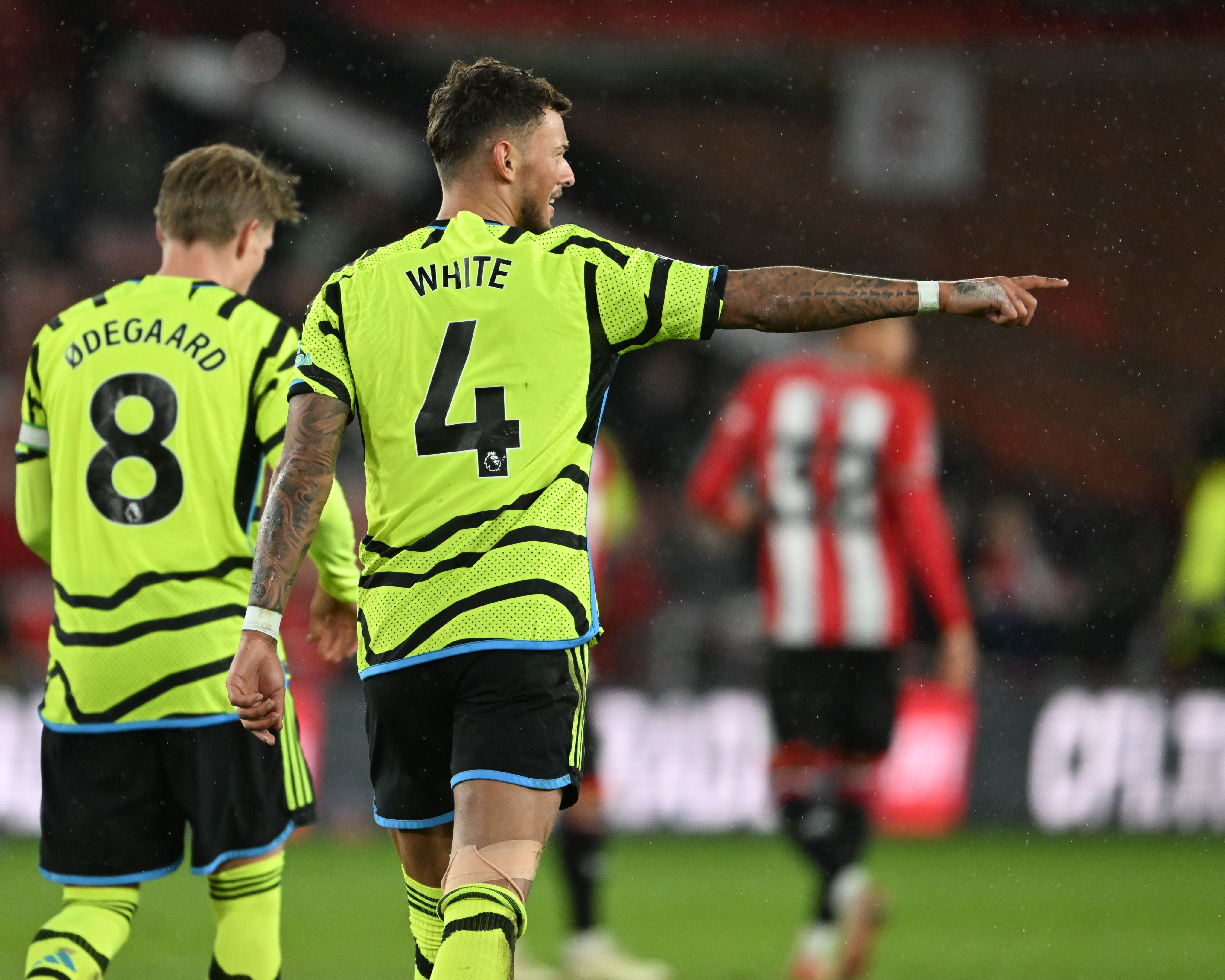SCORING,
SCORING
ARSENAL
The history of Arsenal, told through our 10,000 goals

The club brought up a significant milestone in our thumping win over Sheffield United on March 4 - Ben White's second-half strike was the 10,000th goal our men’s first team have scored in all competitions in our history.
We went into this season still 87 goals away from the big landmark, but thanks to our highest seasonal scoring rate for more than 70 years, Mikel Arteta’s side raced to the figure by the beginning of March.
Indeed it took just six games to score the final 24 goals needed, as we set new records in English league football along the way.
On February 11 we equalled our club record for biggest away win in the Premier League with a 6-0 victory at West Ham, and followed that up six days later with a 5-0 triumph at Burnley.
Next up at the Emirates we beat Newcastle United 4-1 and then became the first side in Premier League history to score at least twice in eight consecutive halves of football when we stormed into a 5-0 half-time lead at Bramall Lane on March 4.
That took us to 9,999 overall goals, and it was left to Ben White – exactly a year after registering his first goal for the club – to put his name in the history books with the momentous strike. Just before the hour mark, he received a pass from Kai Havertz that he dispatched, left-footed, into the bottom corner from just inside the area.
“I wasn't really sure it had gone in!” White said afterwards. “I shot obviously, didn't look where I was shooting and did a little spin, so I didn't actually see the ball go in, but then obviously I heard the crowd. I don't score many, so it's really nice (to get the 10,000th)”.
White’s goal was also significant as it put the seal on another record – we had become the first side in English league history – at all levels – to win three successive away games by at least five goals.
It puts us firmly on course to record our highest-scoring Premier League season to date, a record that was set…. last year. Arteta’s men amassed 88 goals in the league last season, surpassing our previous best of 87 from 2004/05.

The all-time goalscoring tally dates right back to our first match in senior, nationwide football – an FA Cup qualifier in 1889 – and every goal we have scored since then in the football league, FA Cup, League Cup, Community Shield and European competition has counted – and the total now reaches five figures.
It took us 5,839 matches to get there, at a rate of 1.71 per game, and the 10,000 goals were scored by 535 different players (not including own goals). Leading the way with 228 of those strikes is Thierry Henry – our record goalscorer’s haul accounts for just 2.28 per cent of the total – he is one of 19 players to score at least 100. Our goalscorers have netted an average of 18.3 goals each – 85 players scored just once, while 367 of our 902 players represented the first team without ever troubling the scorers.

The overwhelming majority of the goals have come in league football, with 824 in the second tier and 7,193 in the top flight (2,173 have come in the Premier League era).
607 of the goals have been scored in various European competition (including 327 in the Champions League) and 888 in the FA Cup (including qualifying games).
The League Cup, which we first entered in 1966, has seen us score 448 times with the remaining 40 goals coming from our 24 Charity/Community Shield matches.
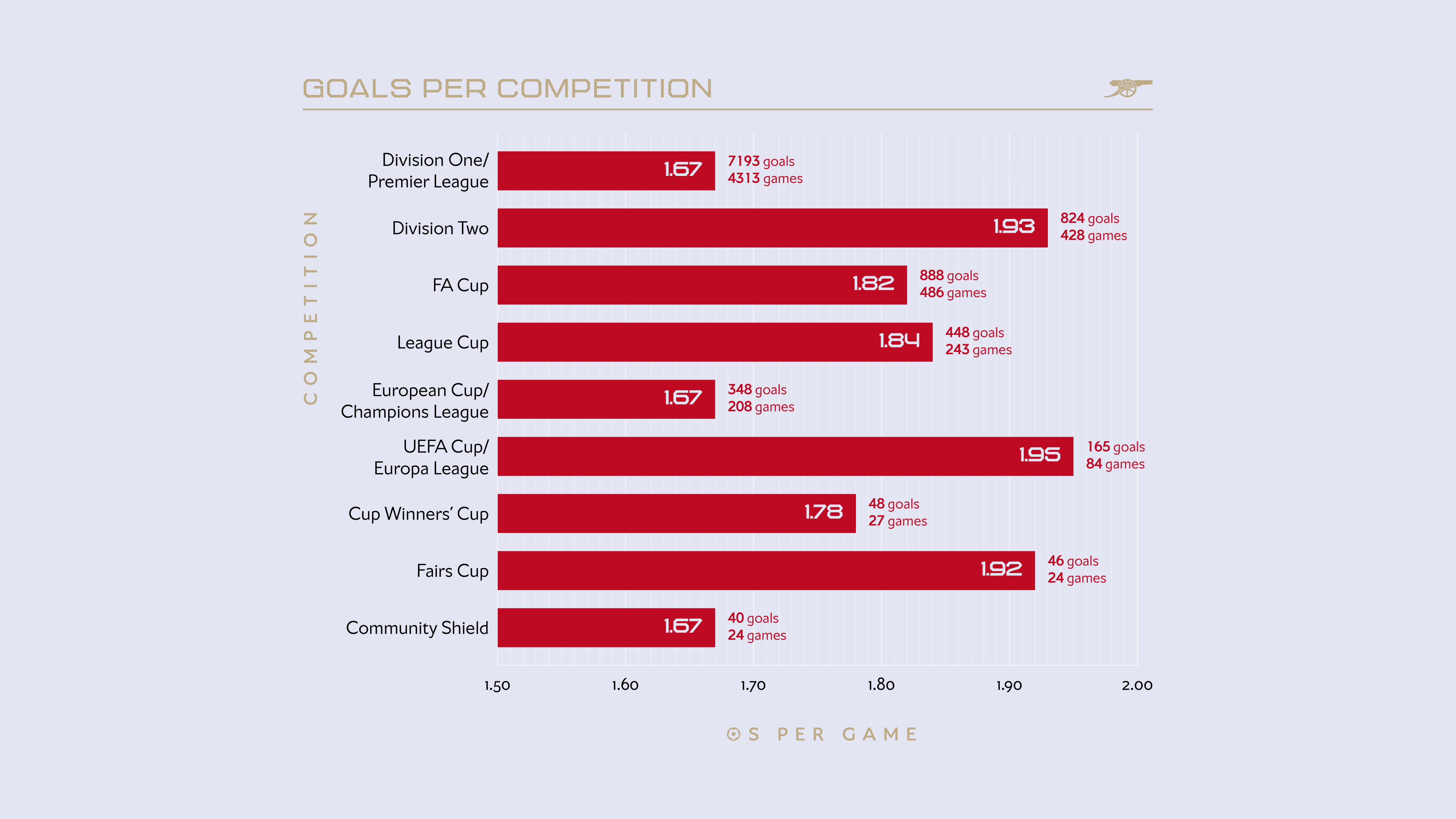
The team has scored 406 goals under Mikel Arteta so far, making him the eighth most prolific manager in our history. Arsène Wenger heads that particular list, with nearly a quarter of all our goals scored under his watch.
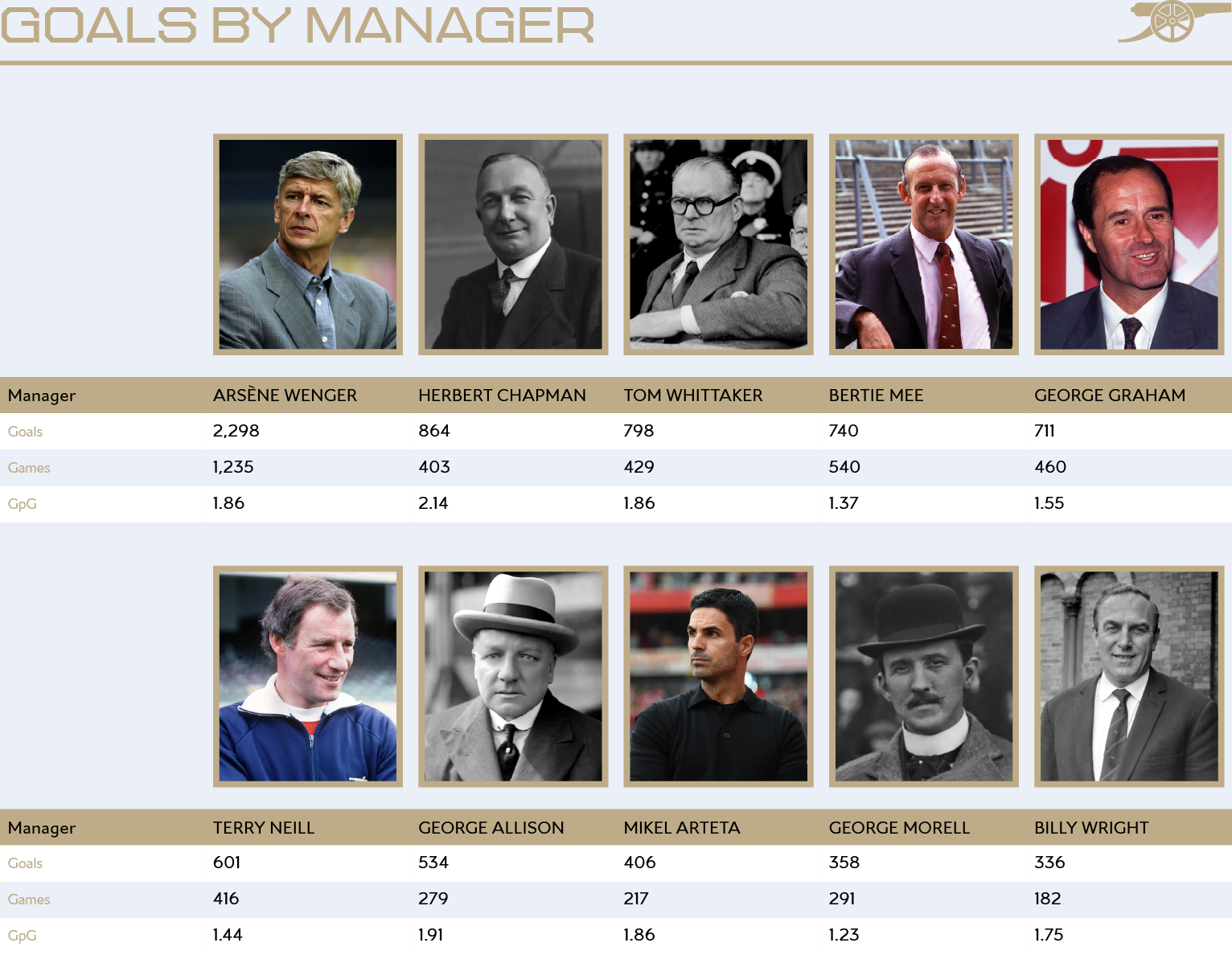
This season is on track to become one of our highest-scoring campaigns on record. We could yet break the all-time club record of 135 set in 1930/31, and the post-war record of 121, set in 2016/17, is in our sights if we continue at our current rate of 2.29 per game.
Our 10,000 goals have been scored against 219 different teams over the past 135 years, with six of those sides conceding more than 300 against us. Everton have been our most frequent victims, with 367 goals conceded from our 221 meetings so far.
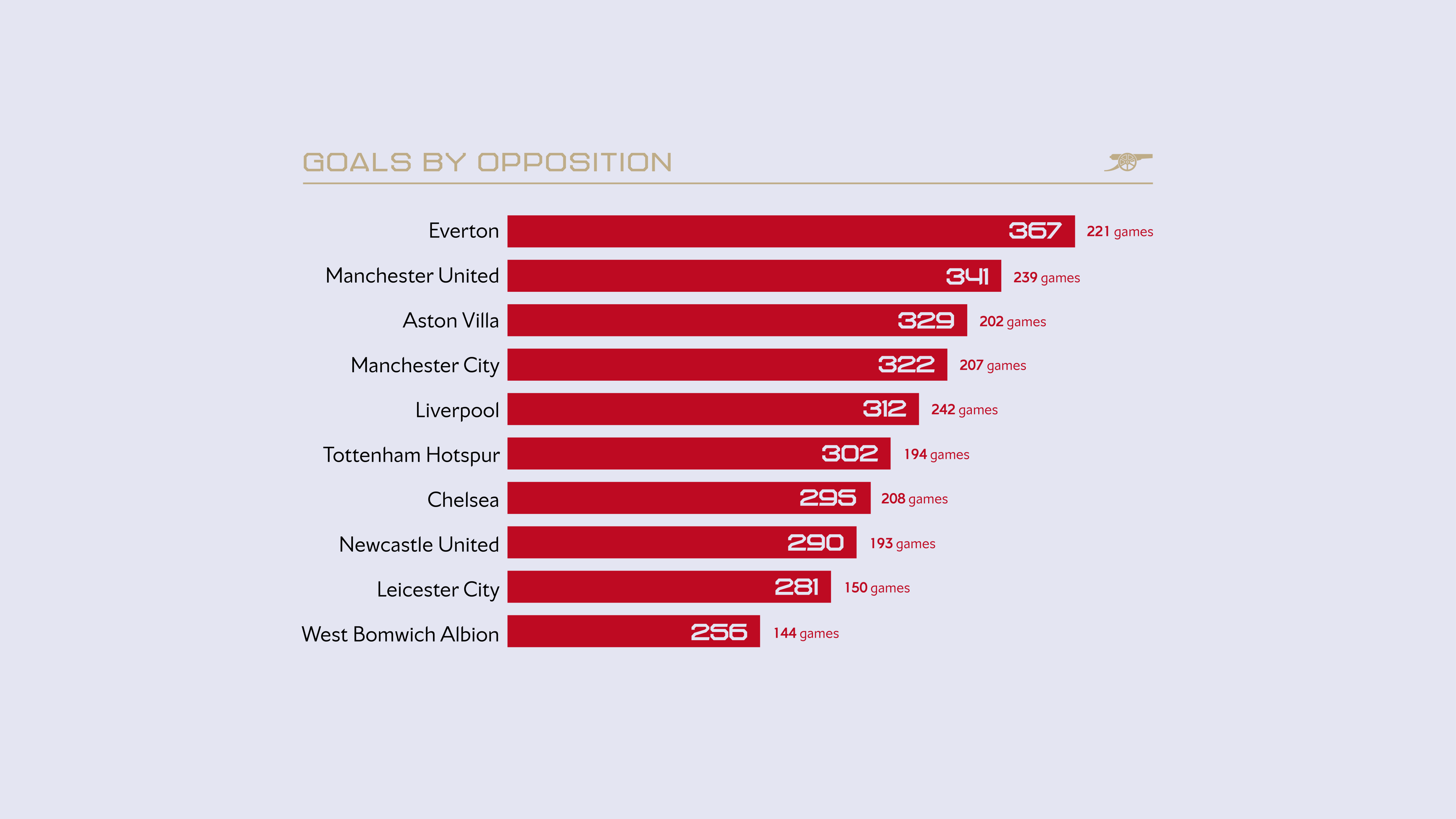
The 10,000 goals we’ve scored means our all-time overall goal difference stands at +2,939, as we have conceded 7,061 times from our 5,839 games.

Two other English clubs have already reached 10,000 – the only two teams above us in an all-time English football league table. Manchester United reached five figures in September 2020, thanks to Marcus Rashford’s strike in a 3-2 win over Brighton, while Liverpool scored their 10,000th goal the following month (Diogo Jota with the landmark goal in a Champions League win over FC Midtylland).
Incidentally we have also been on the wrong end of a famous 10,000th goal. Lionel Messi converted a penalty against us at Emirates Stadium in a Champions League encounter in February 2016 to bring up the mark for FC Barcelona. Messi had also scored their 9,000th goal just six years earlier.
Here we take an in-depth look at each of our milestone goals from through the decades.
GOAL 1
Hope Robertson
Royal Arsenal 11-0 Lyndhurst
FA Cup First Qualifying Round | October 5, 1889
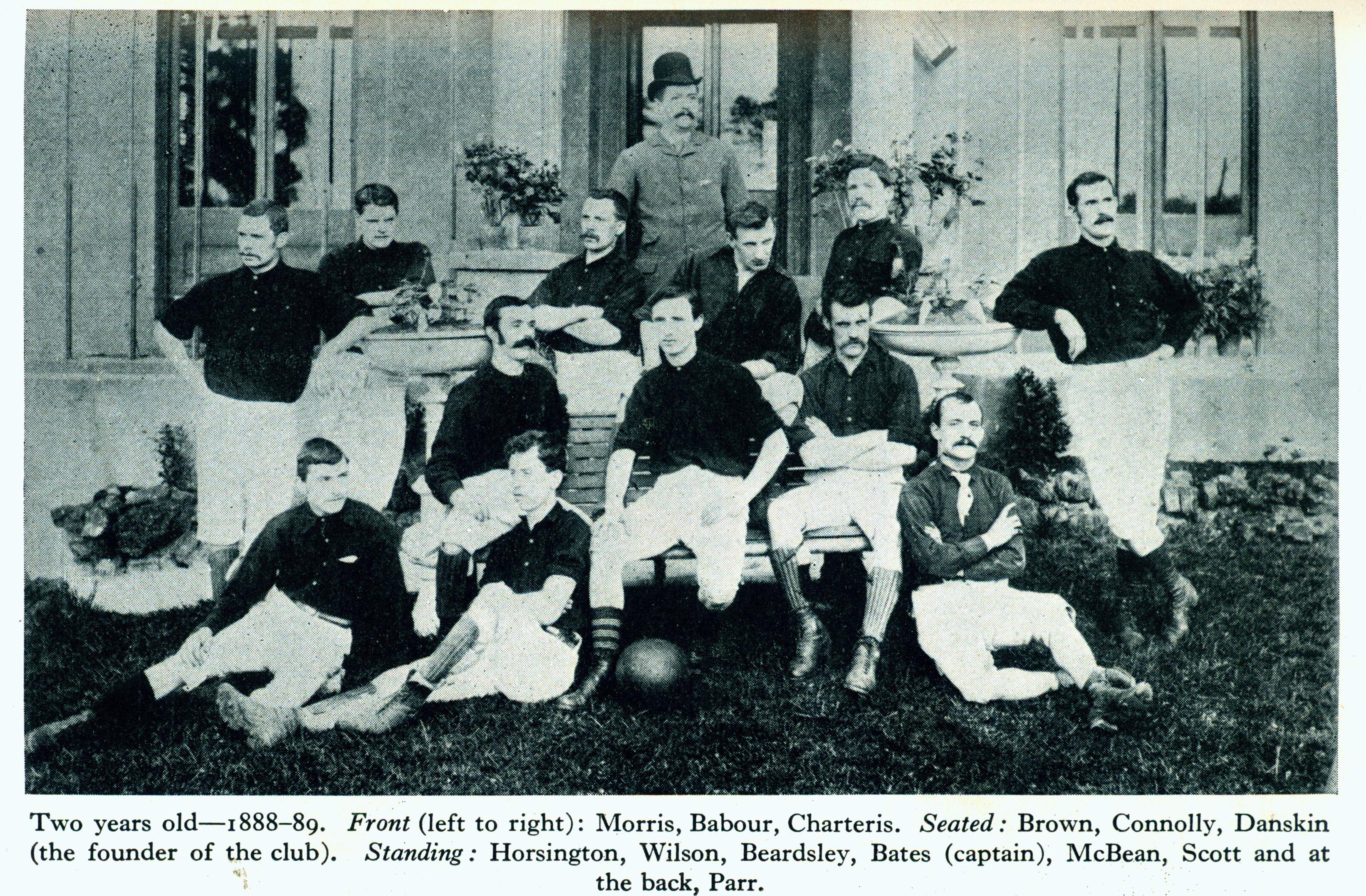

All competitive senior goals for the club are counted from our very first FA Cup match, four years before we had even joined the Football League.
It came against Lyndhurst, in the first qualifying round, on October 5, 1889. Until then, the club’s fixtures had all been friendly matches, or in secondary competitions such as the London Senior Cup and Kent Senior Cup.
So Royal Arsenal – as we were then known – first played in national competition football three years after foundation in 1886, and ran out 11-0 winners at the Manor Field, Plumstead.
The man to score the all-important first goal, that launched thousands more? Hope Robertson.
His goal opened the floodgates that day, and we racked up double figures in front of around 2,500 supporters inside the ground. Robertson, an inside left, scored twice that day, and scored two more in the third qualifying round win over Crusaders, before Swifts defeated us 5-1 in the fourth qualifying round – the last stage before the competition proper.
The following season, with league clubs lining up to offer our players the chance to turn professional, Glasgow-born Robertson signed for Everton, who would go on to become champions that year. He later played for Walsall.
Our first 11 senior competitive matches were all in the FA Cup, until we were elected to the football league on May 31, 1893. We scored 40 goals in those 11 matches.
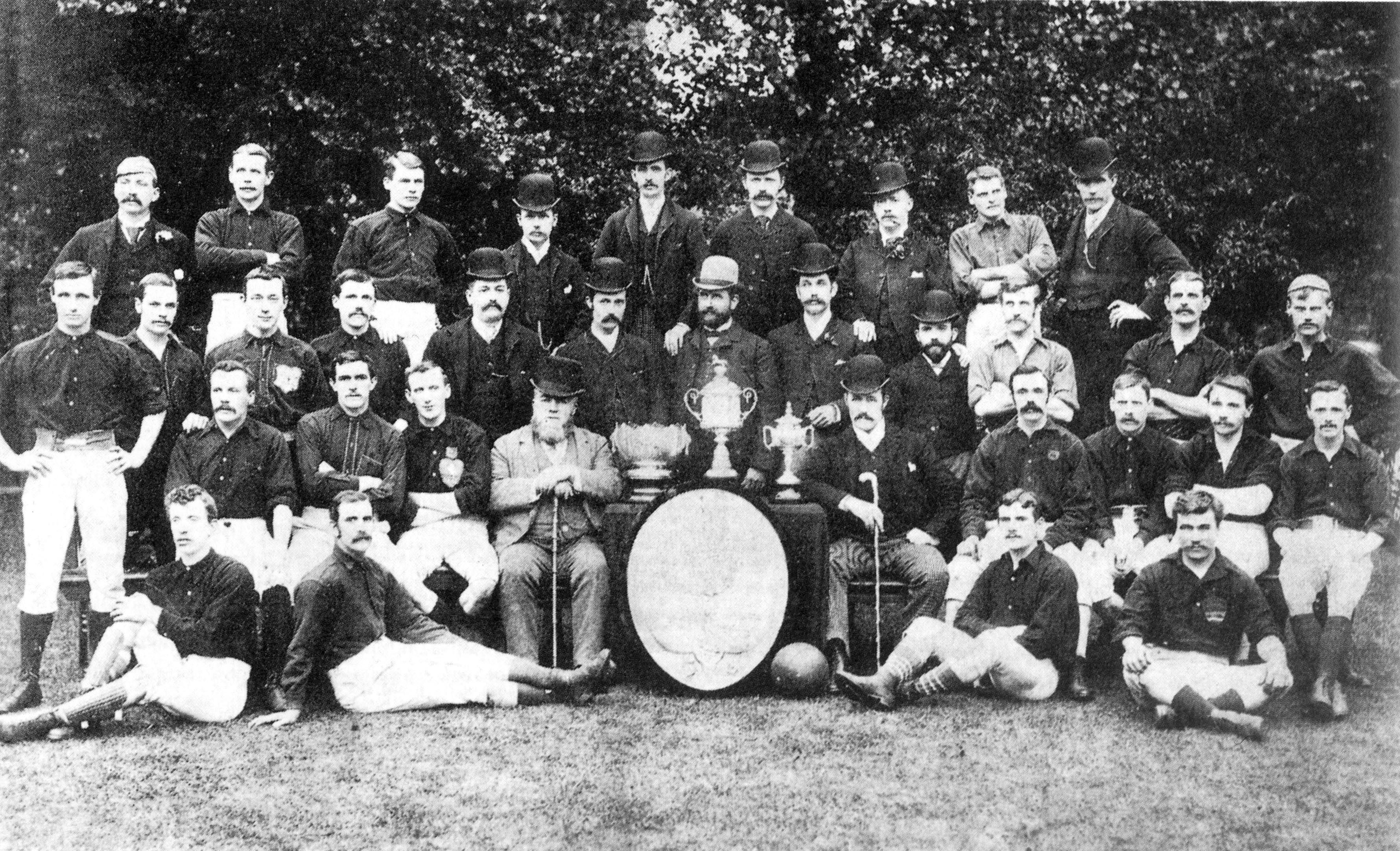
GOAL 1,000
Bertie Freeman
Woolwich Arsenal 2-1 Birmingham City
Division One | April 13, 1907
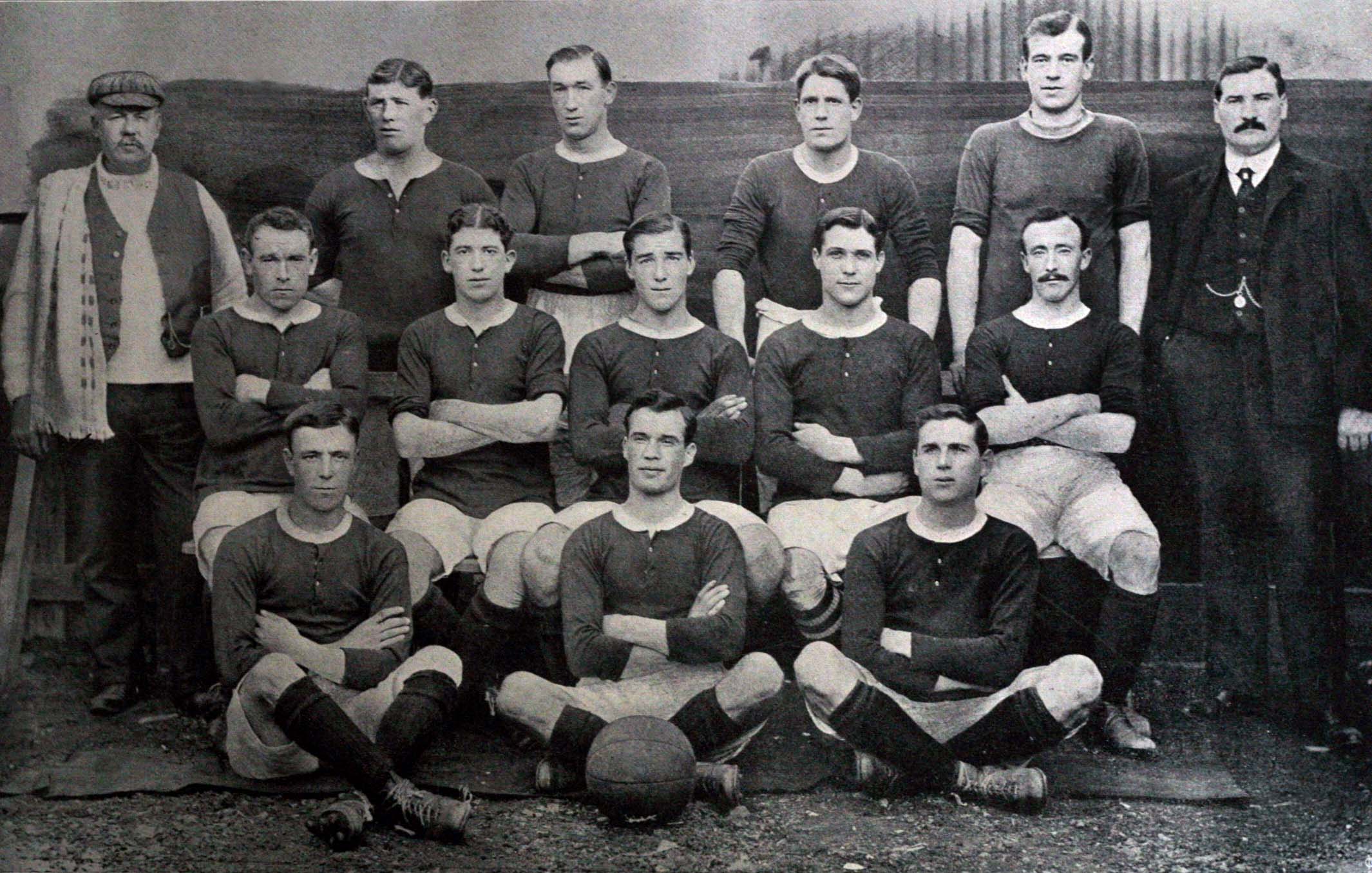

It was nearly 28 years until the club had racked up four figures. Our 1,000th goal was scored at home to Burnley, six years before the club moved to Highbury.
During that time since foundation, the club had changed name to Woolwich Arsenal, played more than 500 matches, used nearly 200 different players, had four full-time managers, moved home to the Manor Ground and won promotion to Division One (in 1904).
So this was our third season as a top-flight side, with Phil Kelso installed as manager shortly before promotion was assured. Having finished 10th and 12th in our first two seasons up, we managed seventh in 1906/07, having briefly been top early in the campaign.
This 2-1 win over Birmingham was our penultimate home game of the season, coming a few weeks after we lost the FA Cup semi-final against Sheffield Wednesday.
Bertie Freeman’s goal in the 70th minute proved to be the winner, earning us both points against fellow midtable side Birmingham.
Freeman, a centre forward who had joined us from Aston Villa in November 1905, scored 24 goals in 49 senior appearances for us, before leaving for Everton at the end of the 1907/08 season. As well as holding the distinction of scoring our 1,000th goal, he once netted seven goals in a game for our reserve side. He enjoyed a hugely successful career after leaving Woolwich Arsenal at the age of 22.
He scored 38 goals from 37 league games during his first season at Everton, helping them to a second-place finish in Division One, and making him the top scorer in the league that year. A skilful forward with a powerful shot, he was capped by England, and joined Burnley after leaving Everton, lifting the FA Cup in 1914. He was top scorer in Division Two in both 1911/12 and 1912/13. After retiring in 1924 he established a silversmith business, and died at the age of 69 in 1955.


Woolwich Arsenal in action at the Manor Ground, Plumstead in 1905/06
Woolwich Arsenal in action at the Manor Ground, Plumstead in 1905/06

Bertie Freeman
Bertie Freeman

Phil Kelso, manager during the 1906/07 season
Phil Kelso, manager during the 1906/07 season

Action from a 2-1 home win over Liverpool on October 6, 1906
Action from a 2-1 home win over Liverpool on October 6, 1906
GOAL 2,000
Sid Hoar
Arsenal 3-2 Blackburn Rovers
Division One | March 17, 1928
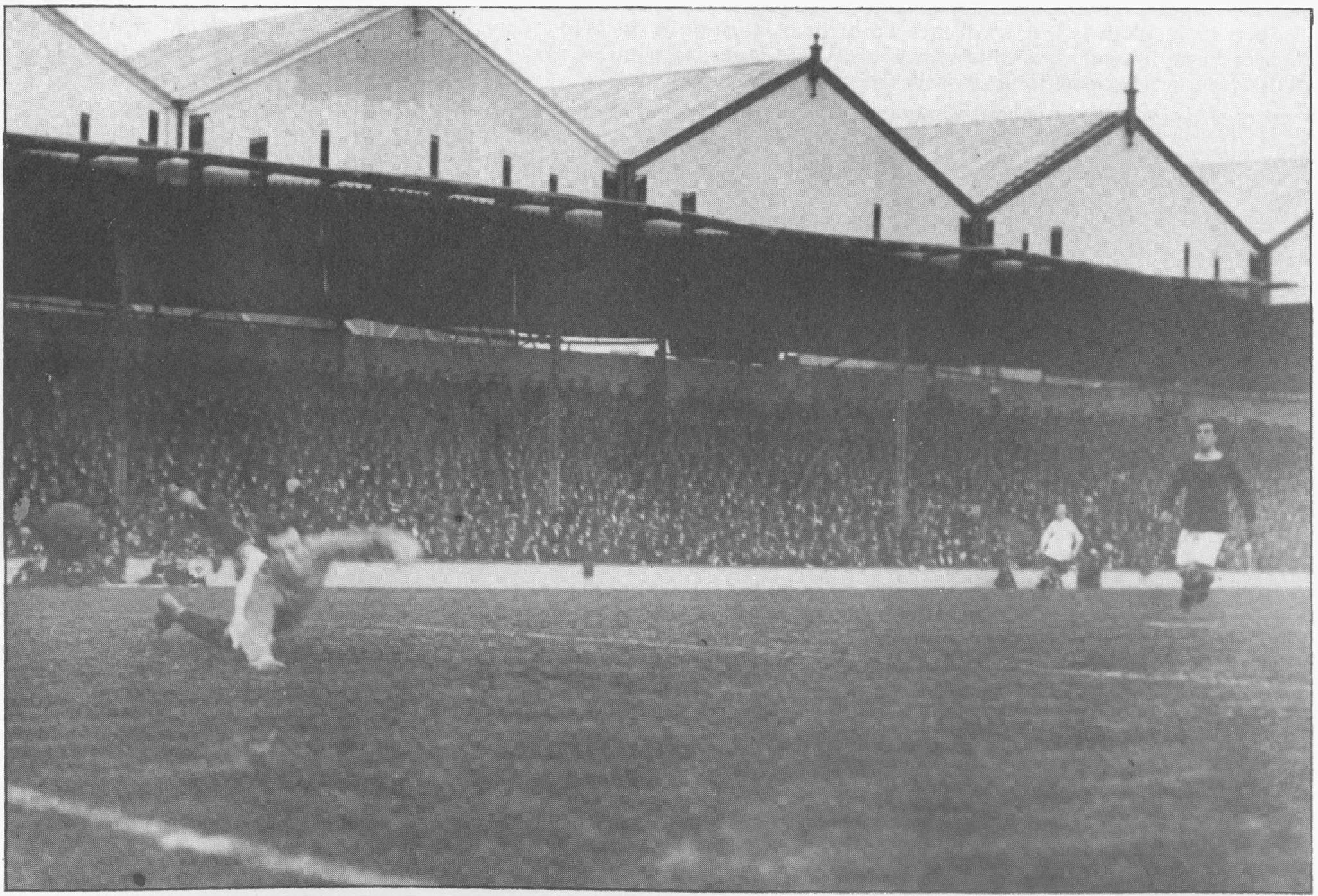

Twenty-one years (and the interruption of World War One) later, we scored our 2,000th goal. English football continued as entertainment during the war years, but was not played competitively. We principally participated in the London Combination between 1915 and 1919, scoring more than 250 goals in those matches – but they are not included in our 10,000.
We had been elevated into Division One – by virtue of receiving the most votes of the seven teams who applied for the final spot in the reshaped post-war top flight – when football resumed after the war. By 1928 we were an established Division One team, and had finished runners-up in Herbert Chapman’s first season in charge two years earlier.
Sydney Hoar scored goal number 2,000, half an hour into a 3-2 home victory over Blackburn Rovers at Highbury.
Hoar (Arsenal heritage number 315) spent five seasons at the club, and scored 18 times from 117 appearances – mainly on the wing. He was part of the first-ever Gunners team to play in an FA Cup final, a 2-0 defeat to Cardiff City in 1927.
The game in which he netted our 2,000th goal was our 31st league fixture of a season in which we were destined to finish tenth, so perhaps the players had more than half an eye on the following weekend’s meeting with the same opposition – this time in the FA Cup semi-final.
However we went on to lose that game 1-0, and it would be another two years until we finally lifted our first major honour – the FA Cup in 1930. Chapman’s team beat Huddersfield Town 2-0 in that final, thanks to our 2,188th and 2,189th all-time goals.
By this time Hoar had left Arsenal for Clapton Orient, though he retired after one season with them, to become a shopkeeper in Luton, having started out as a straw hat maker before becoming a professional footballer.
He died in 1967 at the age of 71.
e years (and the interruption of World War One) later, we scored our 2,000th goal. English football continued as entertainment during the war years, but was not played competitively. We principally participated in the London Combination between 1915 and 1919, scoring more than 250 goals in those matches – but they are not included in our 10,000.
We had been elevated into Division One – by virtue of receiving the most votes of the seven teams who applied for the final spot in the reshaped post-war top flight – when football resumed after the war. By 1928 we were an established Division One team, and had finished runners-up in Herbert Chapman’s first season in charge two years earlier.
Sydney Hoar scored goal number 2,000, half an hour into a 3-2 home victory over Blackburn Rovers at Highbury.
Hoar (Arsenal heritage number 315) spent five seasons at the club, and scored 18 times from 117 appearances – mainly on the wing. He was part of the first-ever Gunners team to play in an FA Cup final, a 2-0 defeat to Cardiff City in 1927.
The game in which he netted our 2,000th goal was our 31st league fixture of a season in which we were destined to finish tenth, so perhaps the players had more than half an eye on the following weekend’s meeting with the same opposition – this time in the FA Cup semi-final.
However we went on to lose that game 1-0, and it would be another two years until we finally lifted our first major honour – the FA Cup in 1930. Chapman’s team beat Huddersfield Town 2-0 in that final, thanks to our 2,188th and 2,189th all-time goals.
By this time Hoar had left Arsenal for Clapton Orient, though he retired after one season with them, to become a shopkeeper in Luton, having started out as a straw hat maker before becoming a professional footballer.
He died in 1967 at the age of 71.


The first trophy-winning Arsenal team, with the FA Cup in 1930. Back row (left to right): Alf Baker, Jack Lambert, Charlie Preedy, Bill Seedon, Eddie Hapgood, Bob John. Middle row: Herbert Chapman (manager), David Jack, Tom Parker, Alex James, Tom Whittaker (trainer). Front Joe Hulme, Cliff Bastin.
The first trophy-winning Arsenal team, with the FA Cup in 1930. Back row (left to right): Alf Baker, Jack Lambert, Charlie Preedy, Bill Seedon, Eddie Hapgood, Bob John. Middle row: Herbert Chapman (manager), David Jack, Tom Parker, Alex James, Tom Whittaker (trainer). Front Joe Hulme, Cliff Bastin.

Herbert Chapman - legendary manager of the 1920s and 30s
Herbert Chapman - legendary manager of the 1920s and 30s

Scorer of goal number 2,000 - Sid Hoar
Scorer of goal number 2,000 - Sid Hoar

The team that played our first season at Highbury (1913/14)
The team that played our first season at Highbury (1913/14)
GOAL 3,000
Jackie Milne
Arsenal 2-0 Preston North End
Division One | December 11, 1937


By the time we scored our 3,000th goal, we were unquestionably the foremost club in the country. It took less than ten years to bring up our third thousand, as George Allison continued the fine work of his predecessor Chapman, and Arsenal built ‘the team of the 30s’.
During the early part of the decade we surpassed the 100-goal in a season barrier four times out of five, including our most prolific ever campaign – 1930/31 when we netted 135 times from 46 matches at a rate of 2.93 per game. In fact three of our 14 highest-scoring seasons came in this period (the other 11 were all recorded during Arsène Wenger’s tenure).
Our 3,000th goal came during the league title-winning season of 1937/38 – our fifth league title in the space of eight years. We had been down in 11th place in November, but we put together a relentless run to head to the top of the league – this win over Preston was our fourth in a row. Jackie Milne (Arsenal player 378) put us ahead with this strike on the hour mark, and Cliff Bastin – by now our record scorer – added a late second.
As for Milne, this milestone goal marked his final ever appearance in an Arsenal shirt. Just three days later the Scotland international joined Middlesbrough. This goal was his 19th from 54 appearances - following his debut at the start of 1935/36 – but he did play enough times this season to earn a championship winner’s medal. After World War Two he went to play in Mexico before retirement. He died at the age of 48 in August 1959.
We lost our next two games after Milne’s move to Middlesbrough but we recovered to clinch our fifth title in eight years on the final day, thanks to a 5-0 win over Bolton.
The goals and trophies were certainly flowing during this time, and supporters were royally entertained. It’s not surprising, therefore, that in every season between 1930/31 and 1937/38 we had the highest average attendances in English football.


Scorer of goal number 3,000 - Jackie Milne
Scorer of goal number 3,000 - Jackie Milne

Herbert Chapman's Arsenal display their trophies in 1931
Herbert Chapman's Arsenal display their trophies in 1931

Former record goalscorer, Cliff Bastin
Former record goalscorer, Cliff Bastin

Hugely successful Arsenal manager George Allison talks to the press at Highbury in 1936
Hugely successful Arsenal manager George Allison talks to the press at Highbury in 1936
GOAL 4,000
Derek TAPSCOTT
West Bromwich Albion 0-2 Arsenal
Division One | December 29, 1956


Less than two years after Milne struck our 3,000th goal, the outbreak of World War Two brought a halt to league football again. We played three league games at the start of 1939/40, but those games and goals were subsequently voided.
League football resumed in 1946/47, though we did play two FA Cup games the previous season, and the one goal we scored in the unique two-legged FA Cup third round tie against West Ham is counted among our 10,000. George Allison was succeeded by Tom Whittaker as manager in 1947, and we won the league title again in 1948.
Goal number 4,000 was still nine years away though. It came midway through the 1956/57 campaign, just a week after Jack Crayston had been installed as permanent manager following a spell as caretaker. Crayston took over from Whittaker, who died in office in October 1956. Wales international forward Derek ‘Tappy’ Tapscott (Arsenal player number 451) was the man to grab the milestone goal, our second in a 2-0 league win at West Brom.
Tappy had also scored on his debut in 1954 (signing from Barry Town) and remained prolific until leaving for Cardiff in September 1958. He racked up 68 goals in all, from 162 appearances. He was our top scorer in 1956/57 with 25 league goals, helping us to a fifth-placed finish, as the post-Whittaker era began.
After retiring Tappy worked as a representative for Gola and Diadora sports brands. He died at the age of 75 in June 2008, in Cardiff.


Jack Crayston took over as Arsenal boss in 1956
Jack Crayston took over as Arsenal boss in 1956

The title-winning side of 1947/48
The title-winning side of 1947/48

Derek Tapscott in April 1954
Derek Tapscott in April 1954

Arsenal manager Tom Whittaker in 1949
Arsenal manager Tom Whittaker in 1949
Goal 5,000
Bill Stevenson (own goal)
Stoke City 1-3 Arsenal
Division One | April 19, 1969


The halfway point in our list marks the only own goal among the landmarks. Of our 10,000 all-time goals, 208 have officially been credited as own goals, and this was the first in a 3-1 league win away to Stoke City.
George Armstrong scored goal 5,001, and David Court netted 5,002 to wrap up the win at the Victoria Ground.
Scottish-born defender Stevenson joined Stoke from Liverpool, where he had won two league titles, and spent six seasons with the Potters.
The 12 and a half years that had passed since our 4,000th goals were largely fallow years for the club, with one third-place in Division One the highlight in the league. But we did enter European competition for the first time in 1963/64 – scoring 11 times in four games.
We also competed in the League Cup for the first time in 1966/67 – that competition has now accounted for 448 of our 10,000.
We reached the final in 1968 under the management of Bertie Mee, and the club were showing definite signs of improvement by 1968/69. This win over Stoke was our third to last game of the season, in which we would reach the League Cup final again, and finish fourth in the league. European football had been assured, and a return to the glory days were just around the corner…
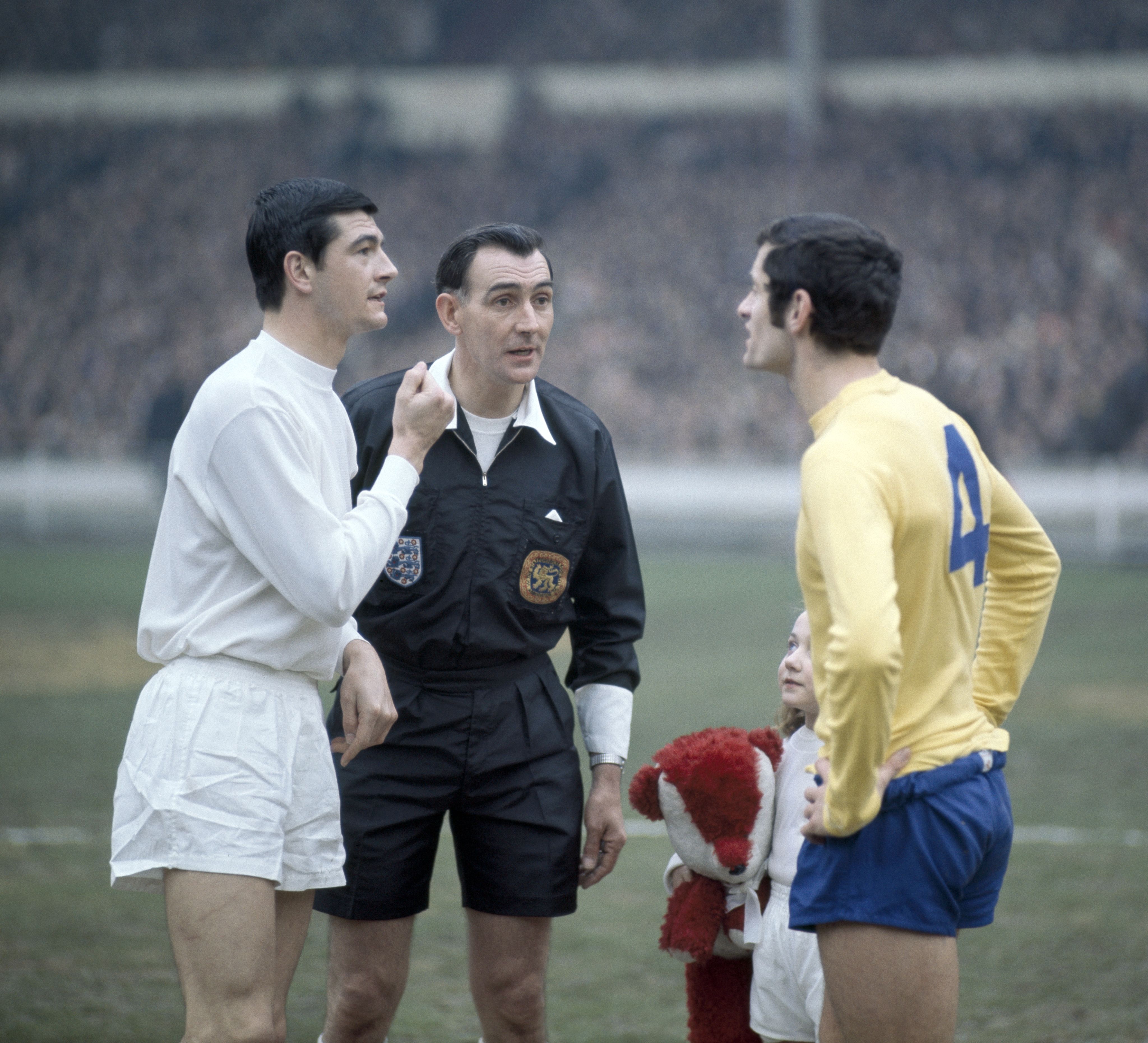

Bertie Mee's Gunners won our first double in 1971
Bertie Mee's Gunners won our first double in 1971

David Court also scored in the 5,000th goal match
David Court also scored in the 5,000th goal match

Stoke defender Bill Stevenson scored our 5,000th goal
Stoke defender Bill Stevenson scored our 5,000th goal

Arsenal come unstuck in the 1969 League Cup final against Swindon Town
Arsenal come unstuck in the 1969 League Cup final against Swindon Town
Goal 6,000
Graham Rix
Arsenal 2-0 Notts County
Division One | September 18, 1982


Ray Kennedy’s goal to win the league at White Hart Lane in 1971 was goal number 5,186 and Charlie George’s belter against Liverpool at Wembley to wrap up the double five days later was goal 5,188.
Other significant goals in this thousand included Alan Sunderland’s dramatic late winner to beat Manchester United in the 1979 FA Cup final (goal 5,771).
The next milestone goal arrived in an early season home victory over Notts County at Highbury, in September 1982. It was scored by Graham Rix (Arsenal player 561), who broke the deadlock after just 19 minutes. John Hollins added a last-minute penalty to seal the points.
A product of our youth system, Rix scored on his debut as a teenager in 1977, and would score 51 times from 464 first-team appearances for us, before playing in France.
This season (in which the team experimented with a green away shirt) turned out to be a disappointing one for Terry Neill’s side.
We finished in 10th place in Division One (with a nearly symmetrical record of P16 D10 L16 F58 A56 Pts58) and were knocked out of both domestic cup competitions at the semi-final stage – both times at the hand of Manchester United. Neill was dismissed as manager early the following season.


Ray Kennedy scores to win the league at White Hart Lane in 1971 - goal number 5,186
Ray Kennedy scores to win the league at White Hart Lane in 1971 - goal number 5,186

Charlie George on the Wembley turf after scoring goal 5,188 to complete the double in 1971
Charlie George on the Wembley turf after scoring goal 5,188 to complete the double in 1971

Wild scenes at Wembley as we beat Manchestert United 3-2 in the 1979 FA Cup final
Wild scenes at Wembley as we beat Manchestert United 3-2 in the 1979 FA Cup final

Midfielder Graham Rix scored our 6,000th all-time goal
Midfielder Graham Rix scored our 6,000th all-time goal

Manager Terry Neill with John Lukic and Charlie Nicholas in 1983
Manager Terry Neill with John Lukic and Charlie Nicholas in 1983
Goal 7,000
Ian Wright
Arsenal 2-2 Brondby
Cup Winners’ Cup R2, second leg | November 3, 1994


The man who scored our landmark 7,000th goal would go on to break our all-time goalscoring record less than four years later.
Ian Wright (Arsenal player 628) netted our first – from the penalty spot – in a 2-2 draw at home to Brondby to ensure we reached the quarter-final of the European Cup Winners’ Cup. And what’s more, our master striker brought up the milestone on his 31st birthday.
So he had double reason to celebrate 26 minutes into the game. Tony Adams was felled inside the area, and Wright stepped up to convert his penalty, and put us level on the night at 1-1, and back ahead on aggregate, after we won the first leg 2-1 in Denmark.
Before kick-off, Wright had been presented with a commemorative trophy by David O’Leary and John Radford, to mark the striker breaking David Jack’s 60-year-old club record, of netting in ten successive appearances.
This goal made it 11 scoring games in a row, and he would also bag a brace three days later in a 2-0 home win over Coventry City back in the league.
Wright’s goalscoring exploits continued over the coming years, and he overtook Cliff Bastin’s long-standing record tally of 178, early in the 1997/98 season. His historic 179th strike – in a 4-2 home win over Bolton Wanderers – was goal number 7,203 in our history.
Goal number 7,000 was crucial in our Cup Winners’ Cup run of 1994/95, as we looked to retain the trophy, but were beaten by Royal Zaragoza in the final.
Alan Smith’s superb strike to beat Parma in the final of the 1994 European Cup Winners’ Cup was 6,967, and there were plenty of other significant strikes by George Graham’s Gunners between goals 6,000 and 7,000.
Michael Thomas’s last-minute goal that won the league at Anfield in 1989 was number 6,558, Andy Linighan’s even later header to win the FA Cup in 1993 was goal 6,882.


One of the most famous goals of all - Michael Thomas wins the league at Anfield in 1989 with goal 6,558
One of the most famous goals of all - Michael Thomas wins the league at Anfield in 1989 with goal 6,558

Andy Linighan heads goal 6,882 to win the 1993 FA Cup final in the last minute
Andy Linighan heads goal 6,882 to win the 1993 FA Cup final in the last minute

Alan Smith volleys goal 6,967 to win the Cup Winners' Cup final against Parma in 1994
Alan Smith volleys goal 6,967 to win the Cup Winners' Cup final against Parma in 1994

Ian Wright was presented with an award for breaking the record for consecutive games scored in, on the day he would notch goal 7,000
Ian Wright was presented with an award for breaking the record for consecutive games scored in, on the day he would notch goal 7,000

Ian Wright celebrates his 179th goal, and Arsenal's 7,203rd
Ian Wright celebrates his 179th goal, and Arsenal's 7,203rd
Goal 8,000
Jose Antonio Reyes
Arsenal 2-1 Stoke City
FA Cup third round | January 9, 2005
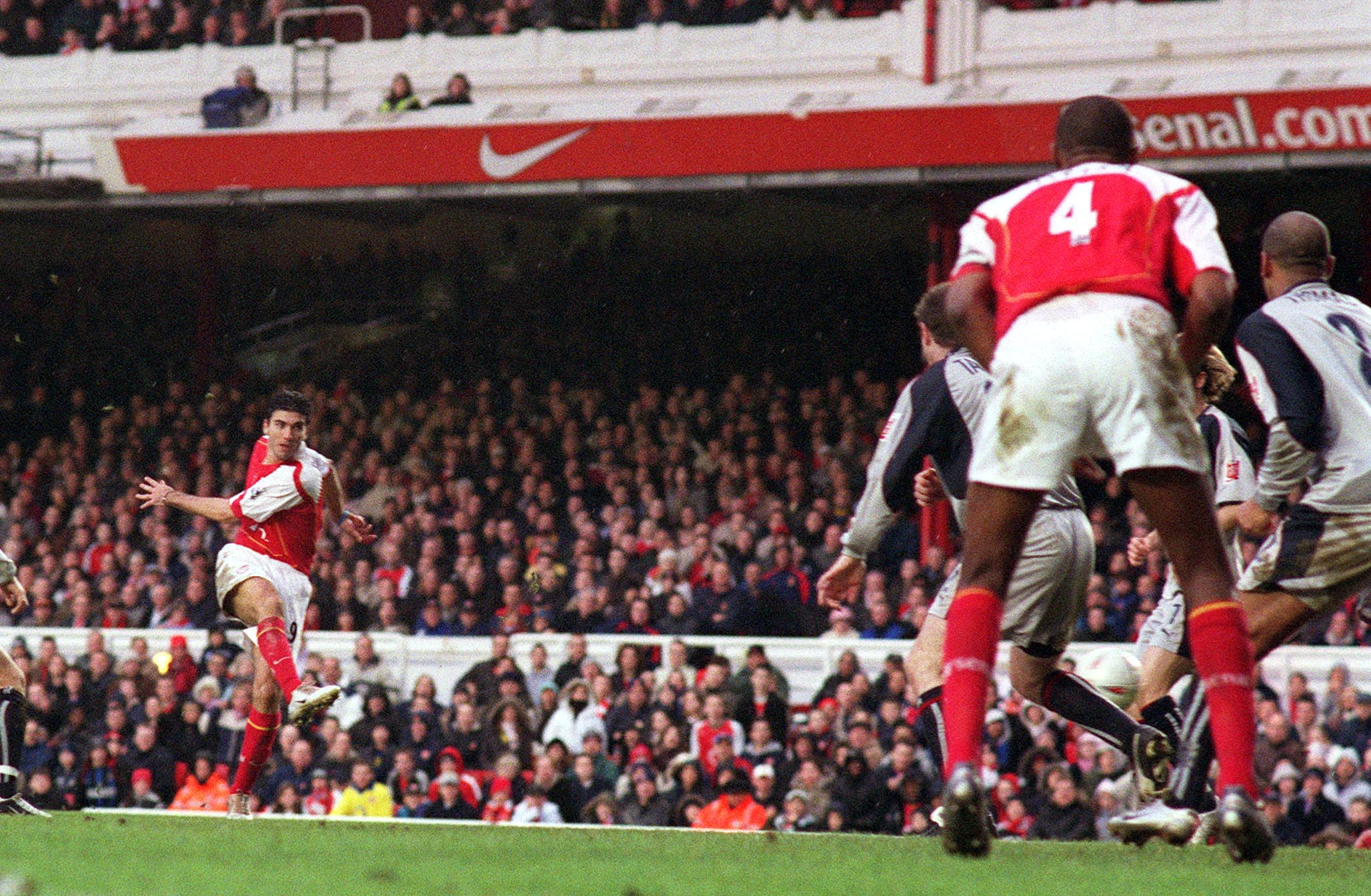

The club had lifted no fewer than 10 domestic honours between scoring our 7,000th and 8,000th goals.
And this 8,000th goal began the journey that would end with more silverware four months later. Since Ian Wright’s goal against Brondby, we had won three league titles (one of them unbeaten), four Community Shields and three FA Cups.
All had come under the management of Arsène Wenger, who took over once the team had scored 7,136 goals, near the start of the 1996/97 season. By the time of his departure in 2018, the team had added a further 2,298 – meaning he was in charge for 23 per cent of our total goals scored.
Tony Adams’ strike against Everton at Highbury to wrap up the title in 1998 was goal 7,279, Sylvain Wiltord’s clincher at Old Trafford in 2002 was goal 7,691 and Patrick Vieira’s goal that rounded off the unbeaten season at home to Leicester City in 2004 was number 7,928.
Goal number 8,000 was the first in our triumphant 2005 FA Cup campaign, scored by Spanish forward Jose Antonio Reyes (Arsenal player 728). FA Cup winners in two of the past three seasons going into this game, expectations were high again, but Championship side Stoke took a shock lead at Highbury, just before half-time through defender Wayne Thomas.
Four minutes after the break though came Reyes’ equaliser – he volleyed into the bottom left corner from the edge of the area for his ninth of the season. Robin van Persie added the winner 20 minutes from time.
We would go all the way in the competition again that year, beating Manchester United on penalties after a goalless draw in the final at the Millennium Stadium. Vieira’s decisive spot kick in the shootout turned out to be his last-ever kick in an Arsenal shirt.
But goals in penalty shootouts are not counted as part of the 10,000 – incidentally we have scored 95 times in our 24 competitive shoot-outs to date.
For Reyes, this was one of 23 goals he scored for us, after signing from Sevilla midway through the Invincibles season of 2003/04. After 110 appearances, he moved back to Spain, but tragically died at the age of 35 in June 2019.
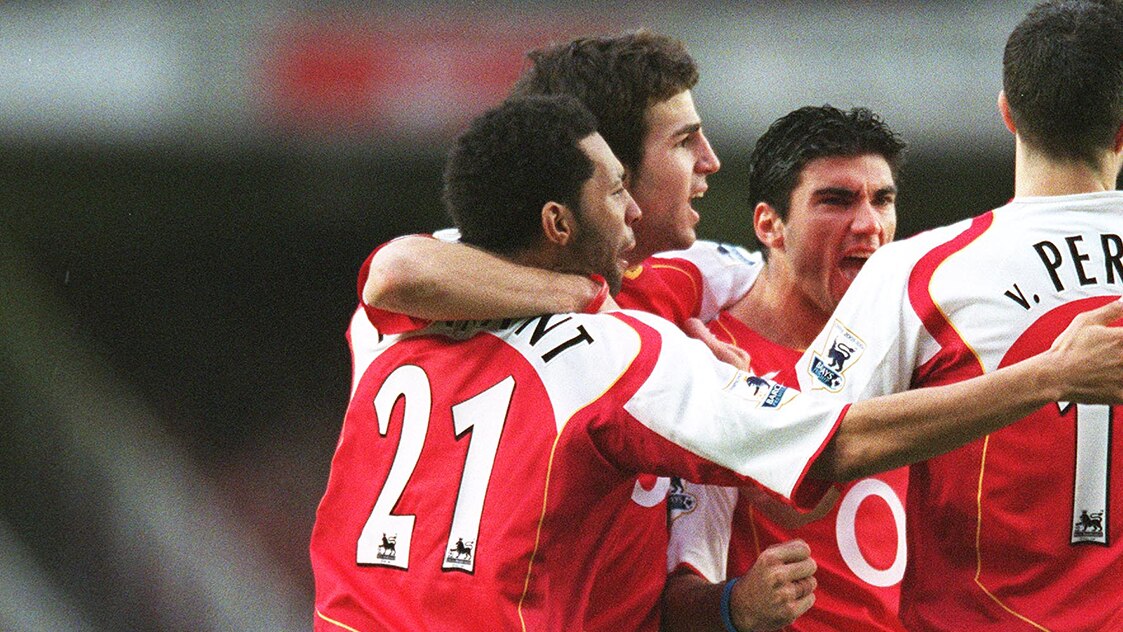

Sylvain Wiltord hits Arsenal goal 7,691 to win the league at Old Trafford in 2002
Sylvain Wiltord hits Arsenal goal 7,691 to win the league at Old Trafford in 2002

Tony Adams celebrates the goal that wrapped up the title in 1998 - goal number 7,291
Tony Adams celebrates the goal that wrapped up the title in 1998 - goal number 7,291

We scored nearly a quarter of all our goals in history during Arsene Wenger's reign
We scored nearly a quarter of all our goals in history during Arsene Wenger's reign

Patrick Vieira's last kick of a ball in Arsenal colours won us the 2005 FA Cup final
Patrick Vieira's last kick of a ball in Arsenal colours won us the 2005 FA Cup final
Goal 9,000
Aaron Ramsey
Arsenal 3-2 Hull City
FA Cup final | May 17, 2014
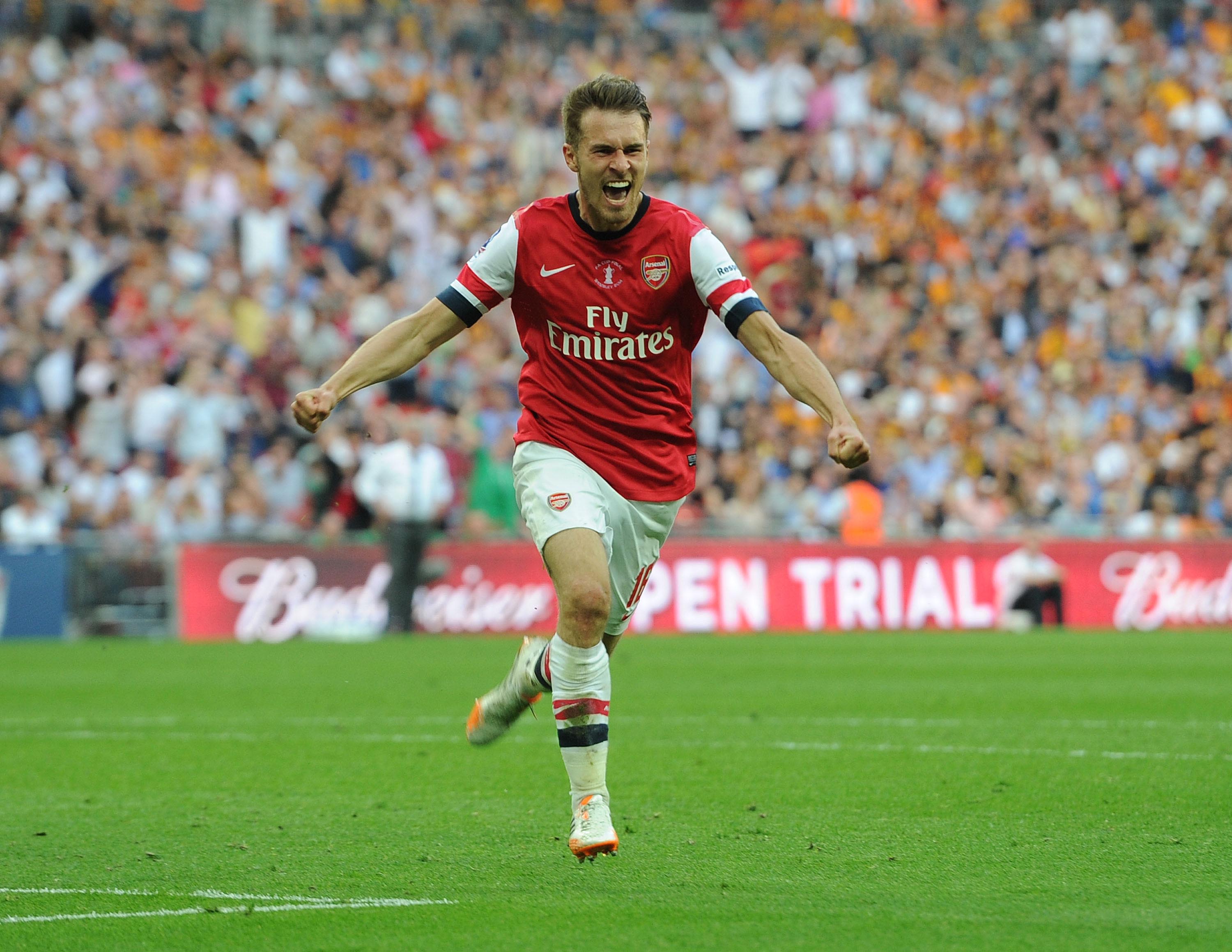

Our landmark 9,000th goal also happened to be the strike that finally ended a nine-year wait for a trophy. We went into the 2014 FA Cup final as big favourites against Hull City, but within eight minutes found ourselves 2-0 down at Wembley Stadium.
Santi Cazorla scored goal 8,998 from a direct free-kick and Laurent Koscielny headed goal 8,999 to get us level. The milestone goal – and FA Cup winner – came 19 minutes into extra-time. Aaron Ramsey (Arsenal player 764) latched onto an Olivier Giroud pass to poke home his 16th goal of a memorable campaign.
It secured us a record-equalling 11th FA Cup, and fifth under Arsène Wenger. Ramsey went on to score 64 goals for us in total (including another FA Cup winner in 2017), from 369 appearances, after joining as a 17-year-old from Cardiff City in 2008.
He left for Juventus in 2019 where he won the Serie A title. He is currently back with first club Cardiff.
The journey from 8,000 to 9,000 goals for the club also incorporated the move to Emirates Stadium in 2006. Gilberto scored our first-ever goal at the stadium, in a 1-1 draw against Aston Villa. It was Arsenal goal number 8,145.
In total we had scored 4,038 from our 2,010 matches at Highbury, and have so far racked up 1.024 at the Emirates from 482 games, at a slightly higher scoring rate of 2.12, compared to 2.01 at Highbury.
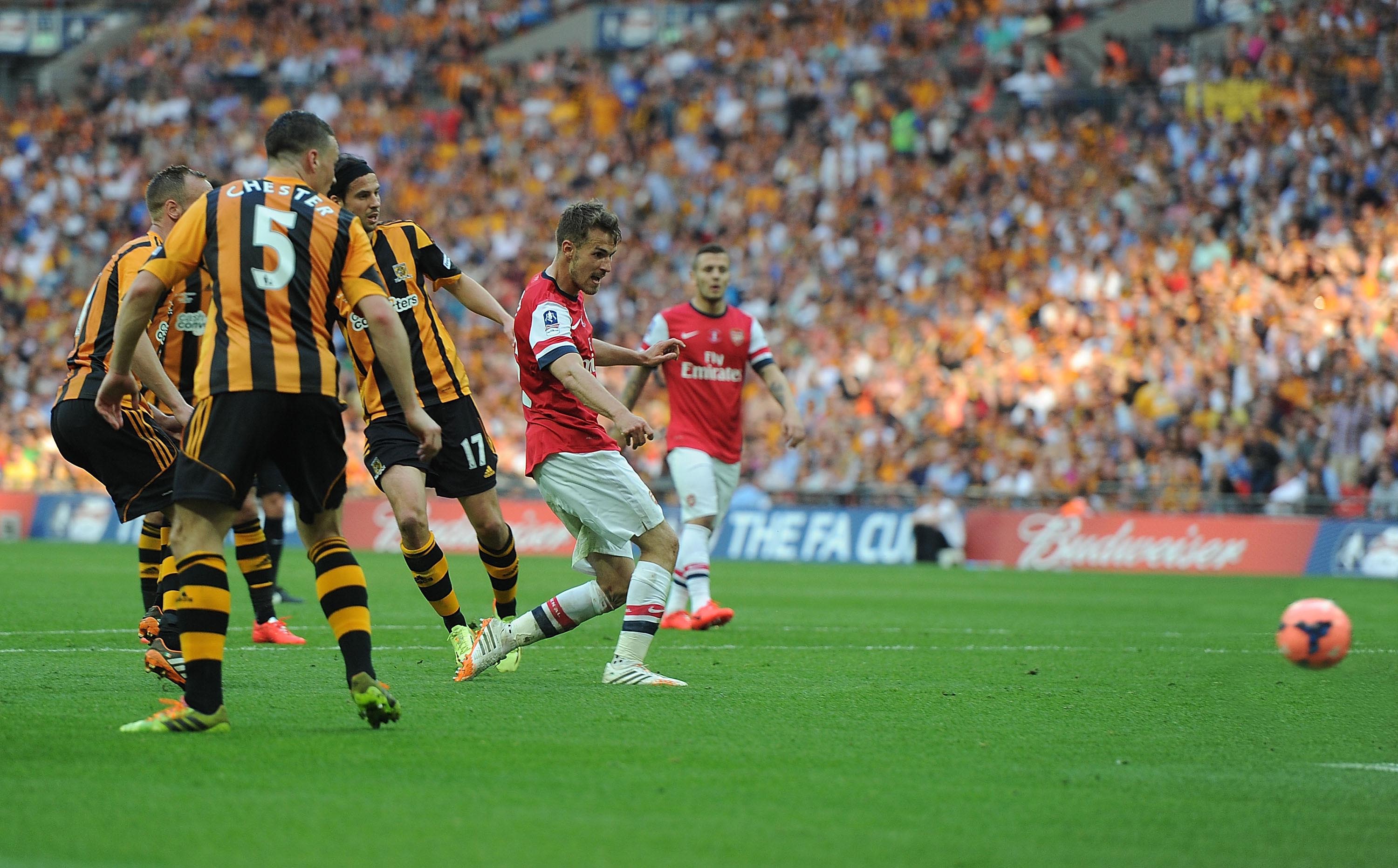

Our first goal at Emirates Stadium was our 8,145th of all time
Our first goal at Emirates Stadium was our 8,145th of all time

Goal 9,000 brought another FA Cup for Arsene Wenger
Goal 9,000 brought another FA Cup for Arsene Wenger

Ramsey's historic strike resulted in silverware
Ramsey's historic strike resulted in silverware

Mikel Arteta was on the pitch when we scored goal 9,000, and in the dugout when we scored goal 10,000
Mikel Arteta was on the pitch when we scored goal 9,000, and in the dugout when we scored goal 10,000
Goal 10,000
Ben White
Sheffield United 0-6 Arsenal
Premier League | March 4, 2024
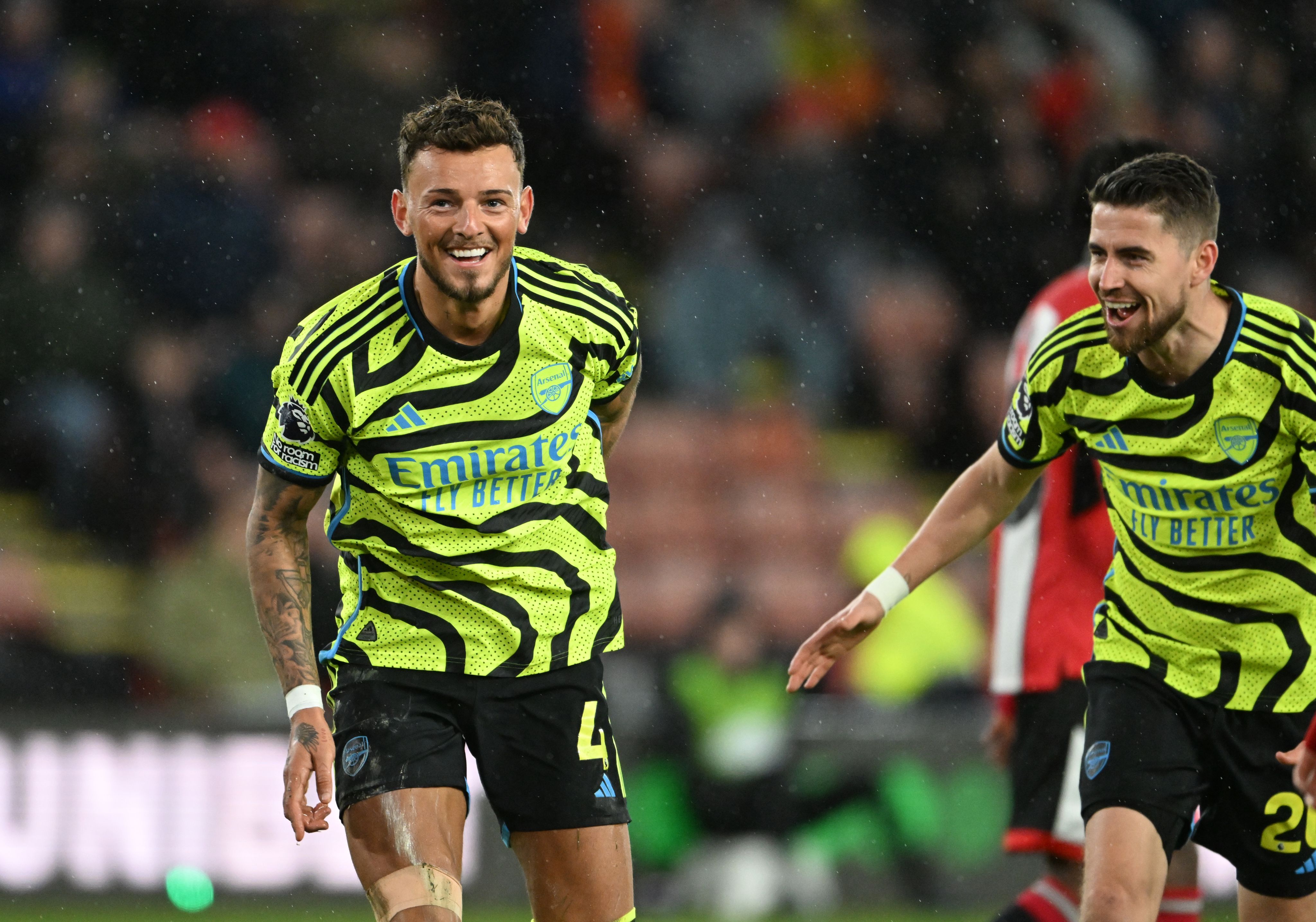

The 10 years between goals 9,000 and 10,000 saw plenty of change at the club.
Arsène Wenger's record-breaking 22-year reign came to an end in 2018, after he added further FA Cups in 2015 and 2017. We beat Aston Villa 4-0 at Wembley to retain the cup in 2015, and two years later we saw off Chelsea 2-1 – Aaron Ramsey’s winner was goal 9,321.
Unai Emery replaced Wenger as Gunners boss ahead of the 2018/19 season, and we soon found our goalscoring boots, netting in 20 league games in a row between August and January.
His tenure came to an end in November 2019 though, after 78 games in charge. Our scoring rate under the Spaniard though was very impressive. We netted 152 times at a rate of 1.95 per game, higher than any other permanent manager in our history since Herbert Chapman in the 1930s.
Freddie Ljungberg (Arsenal player number 670) then took charge on a caretaker basis for six matches, in which time we scored eight goals, before Mikel Arteta returned as manager in December 2019.
Since then Arteta’s Arsenal have scored 406 goals from 218 games at 1.86 goals per game – the same scoring rate as Arsène Wenger’s side.
Ben White (Arsenal player number 882) has scored just four of those, but the defender was the man to strike the momentous 10,000th goal. White became Arteta's ninth signing when he joined from Brighton & Hove Albion in July 2021.
He has now played more than 100 times for us, establishing himself as one of the foremost right-backs in the country, despite initially playing as a centre-back.
Perhaps the most significant goal of the Arteta reign to date was Pierre-Emerick Aubameyang’s winner in the 2020 FA Cup final (goal number 9,639).
It earned us a record-extending 14th FA Cup success, played in an empty Wembley Stadium due to lockdown restrictions in place during the Covid pandemic.
Leandro Trossard’s strike to take the Community Shield to penalties back in August was goal number 9,914.
Incidentally, Arteta (Arsenal player number 795) scored his last goal for us as a player on November 4, 2014 – goal number 9,030.
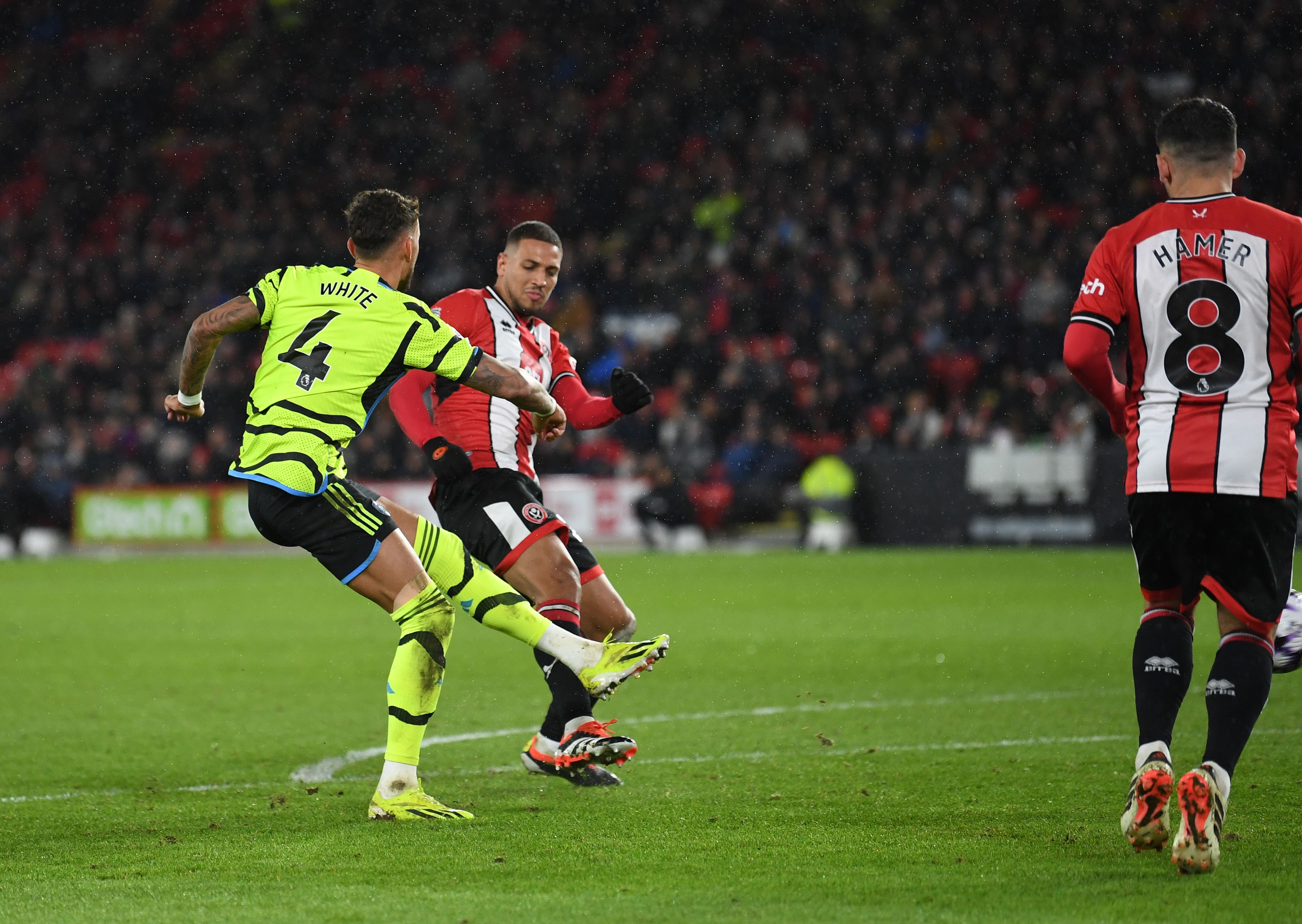

Auba's double won the FA Cup in 2020 - his second was goal 9,639
Auba's double won the FA Cup in 2020 - his second was goal 9,639

Mikel Arteta's last goal for us was Arsenal goal 9,030
Mikel Arteta's last goal for us was Arsenal goal 9,030

Leandro Trossard scores goal 9,914 to win help silverware in August
Leandro Trossard scores goal 9,914 to win help silverware in August

Ben White's first Arsenal goal came against Bournemouth on March 4, 2023 - exactly one year before goal number 10,000
Ben White's first Arsenal goal came against Bournemouth on March 4, 2023 - exactly one year before goal number 10,000
